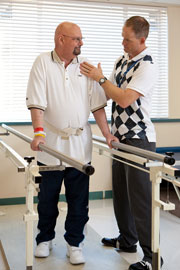Treatment Of Neurological Condition
The nervous system is the most complex organ system in the human body. When a person is suffering from neurological conditions, chances are that the brain or spine is being deeply affected. Once diagnosed with this type of disorder, it’s highly advisable to seek medical treatment of neurological conditions immediately.
Some of the medical approaches used to treat neurological conditions are:
- Cyberknife– one of the most advanced forms in radiosurgery; painless treatment that delivers high doses of radiation to destroy tumors. It uses robotic arms that make it easier to treat areas of the body, such as the spine, because it’s quite flexible.
- Gamma Knife– an advanced radiation treatment for small and medium sized brain tumors, Parkinson’s disease and other neurological conditions. It’s a machine that delivers finely focused dose of radiation to its target with minimized, or none, damage to the surrounding tissue.
- Deep Brain Stimulation (DBS) – an advanced treatment that was discovered to treat Parkinson’s disease. It is also being used in other conditions like dystonia, tremors that are associated with multiple sclerosis and to those who suffer from severe depression.
- Brain Mapping– a process where doctors are able to remove tumors with minimized impact on the crucial areas of the brain that affect movement, speech and senses. By using three dimensional imaging, surgeons are able to locate the specific area they need to operate and remove.
Neurological Physiotherapy
Neurological physiotherapy is a medical procedure where people with neurological conditions undergo physical treatment. It’s probably one of the most common treatments of neurological conditions. Even though they are tailored to treat certain conditions, they also take into consideration the background of each and every patient. Usually, treatments involve methods on how to overcome physical problems that are related to neurological issues. Common treatments include:
- Bobath rehabilitation concept –stimulates sensory pathways by encouraging normal movement patterns
- Conductive education–helps patients in recovering movements by educating them
- Car and shepherd concept –involves relearning normal movements, such as walking and climbing stairs
- Burnstrom concept –based on revitalizing muscle movements
Drug Therapy
Drug therapy is widely used as a treatment of neurological conditions. This type of therapy is commonly used in treating headaches, seizure disorders and facial palsy, just to name a few. Conditions such as epilepsy, bipolar disorder and schizophrenia have no immediate cure as of yet; therefore, drug treatment is the most immediate way of combating the negative effects of the conditions. For example, patients who suffer from epilepsy may have a better chance of preventing seizures, when undergoing drug therapy as treatment of their neurological condition.
Neuropsychology for Neurological Conditions
Neuropsychology studies the structure and functions of the brain, which relate to certain behaviors of people who suffer from neurological conditions. It’s a form of experimental psychology that uncovers the relationship between the nervous system and cognitive functions. When developing treatments of neurological conditions, researchers use tests and brain scans to determine how to go about treating the condition. Usually, this type of therapy is only intended for diagnostic purposes but in some cases it’s also used as a form of constant treatment for patients.

